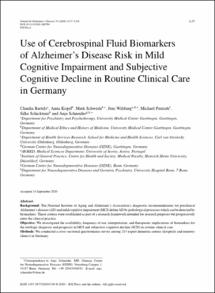Use of Cerebrospinal Fluid Biomarkers of Alzheimer’s Disease Risk in Mild Cognitive Impairment and Subjective Cognitive Decline in Routine Clinical Care in Germany

Use of Cerebrospinal Fluid Biomarkers of Alzheimer’s Disease Risk in Mild Cognitive Impairment and Subjective Cognitive Decline in Routine Clinical Care in Germany

| dc.contributor.author | Bartels, Claudia | |
| dc.contributor.author | Kögel, Anna | |
| dc.contributor.author | Schweda, Mark | |
| dc.contributor.author | Wiltfang, Jens | |
| dc.contributor.author | Pentzek, Michael | |
| dc.contributor.author | Schicktanz, Silke | |
| dc.contributor.author | Schneider, Anja | |
| dc.date.accessioned | 2024-02-02T09:47:04Z | |
| dc.date.available | 2024-02-02T09:47:04Z | |
| dc.date.issued | 2020 | |
| dc.identifier.uri | https://hdl.handle.net/20.500.11811/11295 | |
| dc.description.abstract | Background: The National Institute of Aging and Alzheimer's Association's diagnostic recommendations for preclinical Alzheimer's disease (AD) and mild cognitive impairment (MCI) define AD by pathological processes which can be detected by biomarkers. These criteria were established as part of a research framework intended for research purposes but progressively enter the clinical practice.
Objective: We investigated the availability, frequency of use, interpretation, and therapeutic implications of biomarkers for the etiologic diagnosis and prognosis in MCI and subjective cognitive decline (SCD) in routine clinical care. Methods: We conducted a cross-sectional questionnaire survey among 215 expert dementia centers (hospitals and memory clinics) in Germany. Results: From the 98 centers (45.6% of contacted centers) included, two-thirds reported use of the cerebrospinal fluid (CSF) biomarkers Aß42, tau, and phospho-tau in the diagnostic workup of MCI and one third in SCD. CSF biomarker analysis was more often employed by neurological (MCI 84%; SCD 42%) compared to psychiatric institutions (MCI 61%; SCD 33%; p=0.001). Although dementia experts disagreed on the risk of progression associated with different CSF biomarker constellations, CSF biomarker results guided therapeutic decisions: ~40% of responders reported to initiate cholinesterase inhibitor therapy in MCI and 18% in SCD (p = 0.006), given that all CSF biomarkers were in the pathological range. Conclusion: Considering the vast heterogeneity among dementia expert centers in use of CSF biomarker analysis, interpretation of results, and therapeutic consequences, a standardization of biomarker-based diagnosis practice in pre-dementia stages is needed. | en |
| dc.format.extent | 12 | |
| dc.language.iso | eng | |
| dc.rights | In Copyright | |
| dc.rights.uri | http://rightsstatements.org/vocab/InC/1.0/ | |
| dc.subject | Alzheimer’s disease | |
| dc.subject | biomarker | |
| dc.subject | mild cognitive impairment | |
| dc.subject | prediction | |
| dc.subject | questionnaires | |
| dc.subject | subjective cognitive decline | |
| dc.subject | surveys | |
| dc.subject.ddc | 610 Medizin, Gesundheit | |
| dc.title | Use of Cerebrospinal Fluid Biomarkers of Alzheimer’s Disease Risk in Mild Cognitive Impairment and Subjective Cognitive Decline in Routine Clinical Care in Germany | |
| dc.type | Wissenschaftlicher Artikel | |
| dc.publisher.name | IOS Press | |
| dc.publisher.location | Amsterdam | |
| dc.rights.accessRights | openAccess | |
| dcterms.bibliographicCitation.volume | 2020, vol. 78 | |
| dcterms.bibliographicCitation.issue | no. 3 | |
| dcterms.bibliographicCitation.pagestart | 1137 | |
| dcterms.bibliographicCitation.pageend | 1148 | |
| dc.relation.doi | https://doi.org/10.3233/JAD-200794 | |
| dcterms.bibliographicCitation.journaltitle | Journal of Alzheimer's Disease | |
| ulbbn.pubtype | Zweitveröffentlichung | |
| dc.version | publishedVersion |
Dateien zu dieser Ressource
Das Dokument erscheint in:
-
Publikationen (4)




